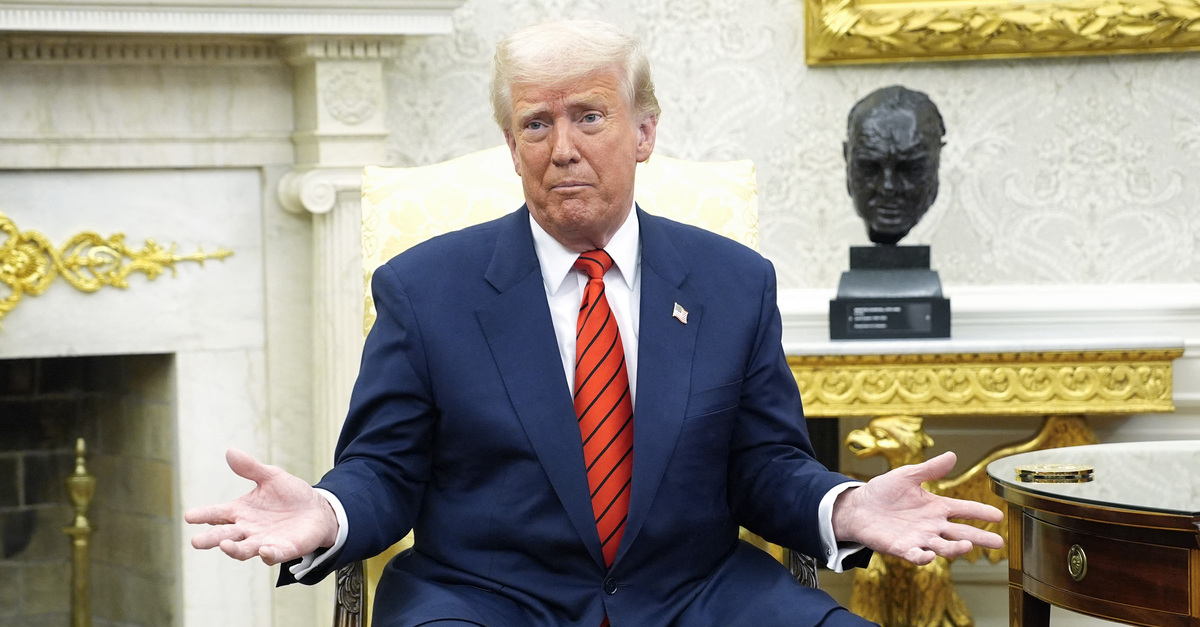
US President Donald Trump sits during his meeting with NATO Secretary General Mark Rutte in the Oval Office of the White House in Washington on March 13, 2025. Photo by Yuri Gripas/Abaca/Sipa USA (Sipa via AP Images).
A federal judge in California has blocked the Trump administration from enforcing two executive orders that call for slashing federal funds to sanctuary jurisdictions, including San Francisco, Seattle and Portland, Oregon.
Senior U.S. District Judge William H. Orrick slammed the brakes on the government’s funding cuts with a preliminary injunction on Thursday in a lawsuit brought by more than 15 cities and counties. The localities sued President Donald Trump and his administration over two executive orders that he signed after taking office in January, specifically the “Protecting the American People Against Invasion” and “Ending Taxpayer Subsidization of Open Borders” orders.
The plaintiffs include San Francisco, Portland, San Diego, Seattle, and Minneapolis, St. Paul, and New Haven.
Orrick, a Barack Obama appointee, noted that the government’s actions were strikingly similar to executive action taken by Trump during his first time in office, in 2017 — which also led to the judge issuing a block.
“Here we are again,” Orrick said in Thursday’s ruling, adding that this time around, the Trump administration, including Attorney General Pam Bondi, are marking “essentially the same argument it made in 2017.”
According to Orrick, the new lawsuit “is on all fours” with the 2017 case, in which lawyers for Santa Clara and San Francisco took on the Trump administration. Orrick noted that both he and the 9th U.S. Circuit Court of Appeals rejected the “same justiciability arguments” in 2017, finding that the plaintiffs had a well-founded fear of enforcement that also warranted an injunction.
More from Law&Crime: ‘Usurping the Executive Branch’s authority’: Trump admin implores SCOTUS to allow enforcement of transgender military ban
Orrick said that the executive orders, along with a memo from Bondi on Feb. 5, which plaintiffs say include language that could lead to the defunding and the elimination of a range of public safety initiatives.
In his ruling, the judge notes that the administration wasn’t specific in what exactly makes a locality a “sanctuary jurisdiction,” but the goal of the combined action from Trump and Bondi was clear.
“Neither Executive Order provides a definition for ‘sanctuary jurisdiction,”” the ruling says. “But a memo from Attorney General Pamela Bondi on February 5, 2025, (the “Bondi Directive”), along with various memoranda and public comments about the orders and their force, provide a clear picture of what jurisdictions qualify, and of the 2025 Executive Orders’ intended purpose: to end or severely curtail federal funding for cities, counties and states that the Trump administration deems to be sanctuary jurisdictions.
Orrick acknowledged that the six-page ruling was relatively light on legal analysis, but that a more in-depth order was forthcoming.
“This is a summary order because of the exigencies it addresses,” the judge wrote in a footnote. “I will enter an order that discusses the issues and my reasoning in more detail at a later date.”
The executive orders violate a litany of protections, the judge wrote.
From the order (citations omitted):
Precedent in the Ninth Circuit and the orders of this court show why the Cities and Counties have established that they are likely to prevail on the merits of at least their separation of powers, Spending Clause, and Fifth and Tenth Amendment claims. The challenged sections in the 2025 Executive Orders and the Bondi Directive that order executive agencies to withhold, freeze, or condition federal funding apportioned to localities by Congress, violate the Constitution’s separation of powers principles and the Spending Clause, as explained by the Ninth Circuit in the earlier iteration of this case in 2018; they also violate the Fifth Amendment to the extent they are unconstitutionally vague and violate due process. The 2025 Executive Orders’ directives to withhold or freeze federal funding to sanctuary jurisdictions also violate the Tenth Amendment because they impose coercive condition intended to commandeer local officials into enforcing federal immigration practices and law.
“And as the order that will follow this one makes plain, the Cities and Counties have also shown a likelihood of success on the merits of their Administrative Procedure Act (“APA”) claim: the Bondi Directive’s order to freeze all DOJ funds is likely arbitrary and capricious, contrary to the Constitution and an ultra vires final agency action under the APA,” the judge added.”
Orrick ultimately believed that the plaintiff cities were more at risk than before.
“Their well-founded fear of enforcement is even stronger than it was in 2017,” Orrick wrote, adding that the concern “stems from the plain language of [the executive orders and Bondi’s memo], numerous directives from executive agencies ordering the withholding of funds to localities like the plaintiffs, and legal action that the Government has already initiated against sanctuary jurisdictions in Illinois and New York, in addition to recent statements from high ranking government officials and the litigation over these issues in the first Trump administration.”
Love true crime? Sign up for our newsletter, The Law&Crime Docket, to get the latest real-life crime stories delivered right to your inbox.








